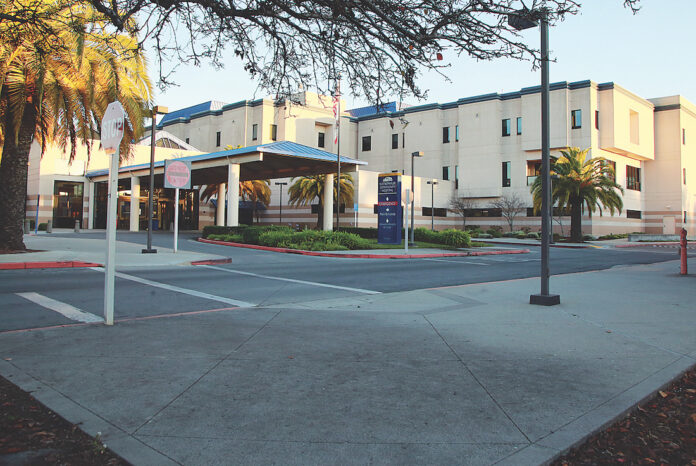WATSONVILLE—Through a series of contributions and donations, the Pajaro Valley Health Care District (PVHCD) has gathered together enough money to purchase Watsonville Community Hospital, ending months of nail-biting in which the fate of the 127-year-old institution hung in the balance.
PVHCD will close escrow on the $67 million sale by the end of the week, and the purchase will be finalized on Aug. 31, Santa Cruz County Chief Administrative Officer Carlos Palacios said Tuesday during a special Board of Supervisors meeting.
“The purchase is going to happen,” he said.
The only missing piece is roughly $6 million needed to allow the hospital to operate for the next two years, Palacios said, an amount that is expected to come in by the end of September as the County continues to negotiate with other potential donors.
“It’s very exciting news after a lot of effort over the past year,” he said.
The Supervisors were meeting to approve a series of $5 million loans from the City of Capitola, Community Foundation Santa Cruz County and Salud Para La Gente.
The Supervisors also approved loans from the cities of Santa Cruz and Watsonville, both of which unanimously approved them during Tuesday evening meetings.
The temporary zero-interest loans–which must be repaid in 60 days–were devised to cover an expected $25 million contribution from the State of California, which was delayed until September due to a state-level clerical error, Palacios said.
The Watsonville City Council also decided how the proceeds from the sale of the Porter Building will be allocated, with $270,000 going to the PVHCD purchase, and $77,630 going toward the cost of the sale, including legal support, subdividing the parcel and surveying work.
The Council at a future meeting will consider using the remaining $800,000 for development of the city’s long-awaited 2050 General Plan, a proposal that disappointed Councilmen Jimmy Dutra and Eduardo Montesino, who said they wanted the money to go toward something tangible.
Councilman Lowell Hurst agreed, but noted the importance of General Plans, and how expensive they are to create and implement.
“It’s something that’s needed,” he said. “We need to make sure the 2050 General Plan is actually bulletproof, that it can sustain court challenges, that it reflects the will of the city , but it also needs to take into account the needs that exist outside the city limits.”
Watsonville Finance Director Cindy Czerwin pointed out that part of the reason the General Plan has not been updated is the difficulty of finding ways to pay for it.
“This is another very difficult one-time item that needs to be funded,” Czerwin said.
Noting that the cities of Capitola and Santa Cruz have not donated any money to the purchase of the hospital, Dutra suggested that Watsonville reach out to those and other jurisdictions.
He explained that, for too long, South County has not felt supported by its neighbors to the north.
“The overload that Dominican would have if Watsonville wasn’t around would really impact them,” he said. “So it’s really in their best interests to help make sure that this hospital is successful.”
Watsonville Hospital’s storied past dates back to its founding in 1895, but the chapter that brought it to the brink of closure last year began in 1998, when an out-of-town corporation called Community Health Systems (CHS) bought it.
Thus began two decades of shambolic corporate leadership, which included CHS creating a spinoff company called Quorum Health Corporation in 2016. That company sold the hospital to Los Angeles-based Halsen Healthcare in 2019.
Halsen immediately sold the physical building and grounds to Alabama-based Medical Properties Trust (MPT), and leased it from them in a sale/leaseback arrangement. That move was the only bump in an otherwise short-lived and unremarkable leadership, which ended when the hospital’s Board of Directors ousted Halsen after the company was unable to pay its bills.
When the hospital announced in November 2021 that it was facing imminent closure unless a buyer stepped forward, PVHCD did just that, having been formed a month earlier for that very purpose.
If the hospital closed, it would have shifted the brunt of the county’s emergency medical needs onto Dominican Hospital, and forced residents to travel out of the county.
“That was just not an option,” said Salud Para La Gente CEO Dori Rose Inda, who serves as PVHCD’s treasurer.
Board of Supervisors Chair Manu Koenig said he’s glad the purchase process is nearing its end.
“I think we’ve got a really great opportunity to turn the hospital around, and I’m excited to get to the moment when we truly transform this organization,” he said.
Palacios told the Supervisors that keeping the hospital running over the coming years as it struggles to climb out of debt will be a challenge.
“It is going to be very difficult,” he said. “It is a very difficult healthcare environment statewide, nationwide. But we have a plan we think is going to be successful, and it’s the best plan that we could have developed.”
An earlier version of this story incorrectly stated that the Council approved the use of the remaining $800,000 for the General Plan.










